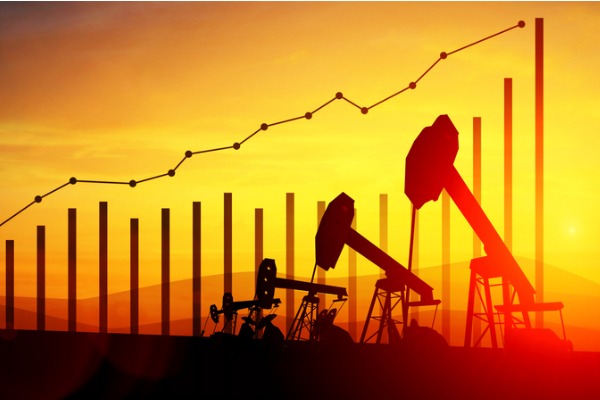Why oil prices will keep rising and the stocks to benefit
4th May 2022 15:36
by Graeme Evans from interactive investor
Despite their surge since Russia's invasion of Ukraine oil prices could have further to rise, according to City experts. It's why investors are still piling into these oil majors.

Brent crude near to $110 a barrel heaped more pressure on consumer-facing stocks today but left BP (LSE:BP.) trading higher after sentiment was further boosted by post-results upgrades.
The 4% rise for Brent came as the European Union unveiled the bloc’s sixth set of sanctions targeting Russia, including a total ban on oil imports within six months.
The move has put supply-side pressures back in focus after China’s struggles with Covid-19 and the rising interest rates outlook had earlier depressed the demand picture.
UBS Global Wealth Management told investors today that it thinks that the market has underpriced energy supply risks and that $115 a barrel is likely. Prior to the Ukraine war, Russian oil and gas accounted for about 25% and 40% of EU consumption respectively.
Oil’s prolonged position above $100 a barrel adds to the inflationary pressures currently forcing the hand of central banks and causing consumers to rein in discretionary spending as they grapple with rising motoring and energy bills.
- Massive week ahead for interest rates in the UK and America
- Warren Buffett: stocks I’m buying and AGM comments
- ii view: BP profits boom, but takes massive hit on Russia exit
- Three oil giants: what to do with the shares now
The UK-focused FTSE 250 index reflected these pressures today as the benchmark fell by 1.4%, compared with a 0.5% decline for the FTSE 100 index. Big second-tier fallers included Currys (LSE:CURY) and Frasers Group (LSE:FRAS), while there was further selling of retail estate investment trusts focused on urban logistics and warehousing.
Sentiment has soured since last week’s disappointing Amazon.com Inc (NASDAQ:AMZN) update, with LondonMetric Property (LSE:LMP) down another 14p to 280p after yesterday’s 5% fall and Tritax Big Box Ord (LSE:BBOX) off a further 9.8p to 213p despite reporting a positive start to the financial year.
Chief executive Colin Godfrey said today: “Demand from a broad range of occupiers for new logistics space remains very strong, underpinning our confidence in our growth prospects.”
He added that the REIT was mitigating construction cost inflation in its development pipeline by locking in fixed price building contracts and passing on increased costs through rents.
The more resilient performance of the FTSE 100 index reflected continued support from energy stocks after BP and Shell (LSE:SHEL) shares rose on the back of the higher Brent price.
Shell, which reports its first quarter figures tomorrow, lifted 17.5p to its highest level since early 2020 at 2,233p. BP, meanwhile, was 3.9p higher at 418.5p as analysts reviewed their price targets in the wake of yesterday’s better-than-expected update.
The company quickened the pace of share buybacks with plans to return $2.5 billion (£2 billion) in the current quarter, having generated $4 billion (£3.2 billion) of surplus cash on the back of surging oil and gas prices in the first three months of the year. Underlying profits of $6.2 billion (£5 billion) were higher than expected and the best quarterly figure since 2008.
The performance stoked calls for an industry windfall tax, which BP sought to offset by revealing plans for £18 billion of investment in the UK’s energy system by 2030.
- Find out what is now being tipped to be the best investment of 2022
- Shares for the future: my five best shares for long-term investment
- A star stock to own at the right price
- Insider: better times ahead for these two well-known shares?
Labour is calling for a 10% rise in corporation tax on North Sea oil and gas profits, but Bank of America said the estimated £1.5 billion proceeds would cost BP about £300 million and be dwarfed by today’s £2 billion upgrade to operating cash flows in the bank’s new forecasts.
Its analysts have a neutral recommendation but higher price target of 430p, pointing out that BP’s net debt is on a par with Shell’s despite its rival having a market value twice as high.
Kepler Cheuvreux has raised its BP price target to 515p from 500p, while UBS is now at 470p compared with 450p before the results as its analysts factor in the improved cash flow generation and impact of the higher buyback.
The bank raised its earnings per share forecasts by 14% for 2022 and 8% on average over 2023-26, a move reflecting the benefits of the lower share count due to the buybacks.
UBS expects BP to deliver another strong performance in the second quarter, despite slightly lower production as the company’s refineries run at full capacity and take advantage of much higher margins. BP shares are up 7% so far this week and by almost 20% this year.
These articles are provided for information purposes only. Occasionally, an opinion about whether to buy or sell a specific investment may be provided by third parties. The content is not intended to be a personal recommendation to buy or sell any financial instrument or product, or to adopt any investment strategy as it is not provided based on an assessment of your investing knowledge and experience, your financial situation or your investment objectives. The value of your investments, and the income derived from them, may go down as well as up. You may not get back all the money that you invest. The investments referred to in this article may not be suitable for all investors, and if in doubt, an investor should seek advice from a qualified investment adviser.
Full performance can be found on the company or index summary page on the interactive investor website. Simply click on the company's or index name highlighted in the article.